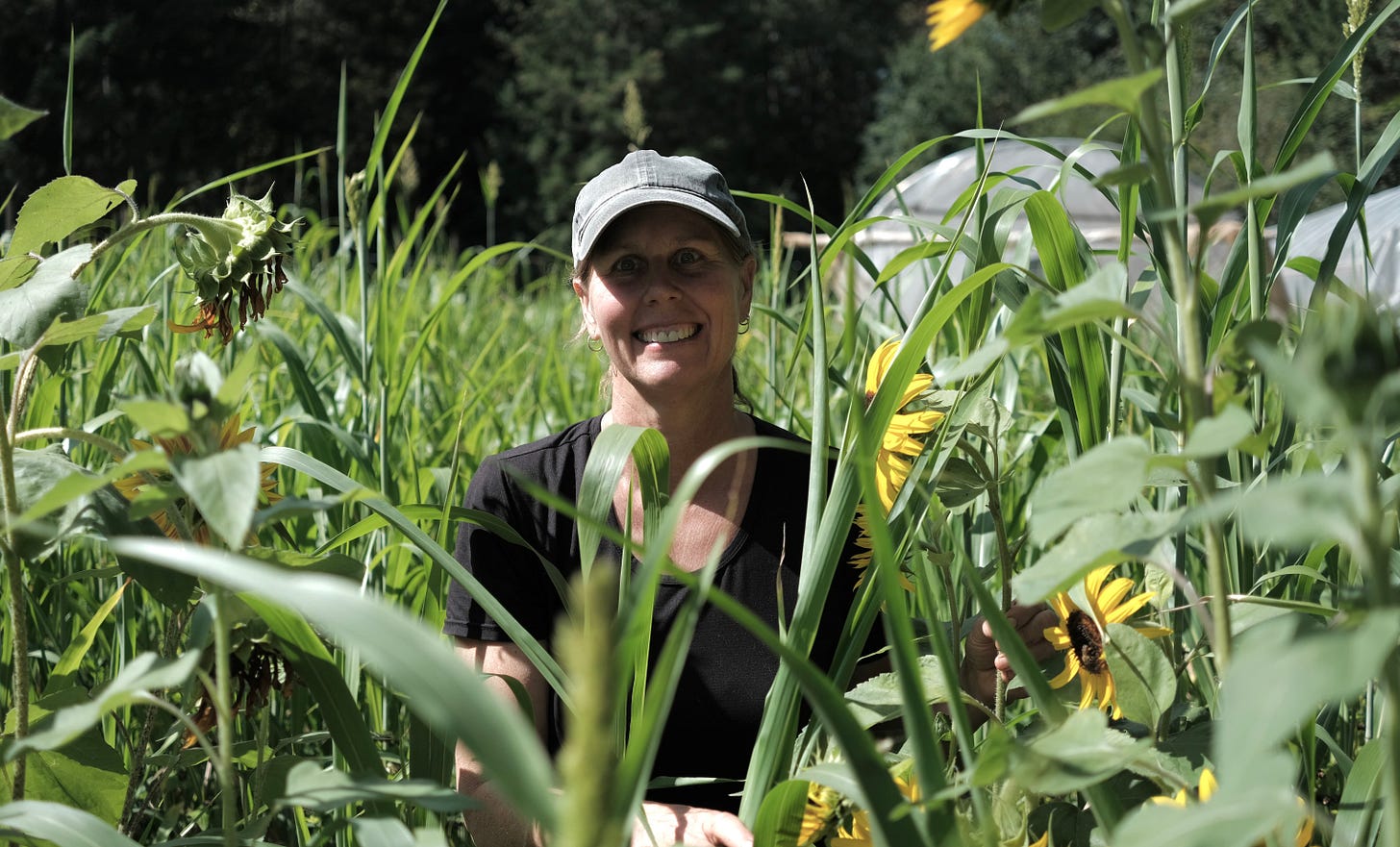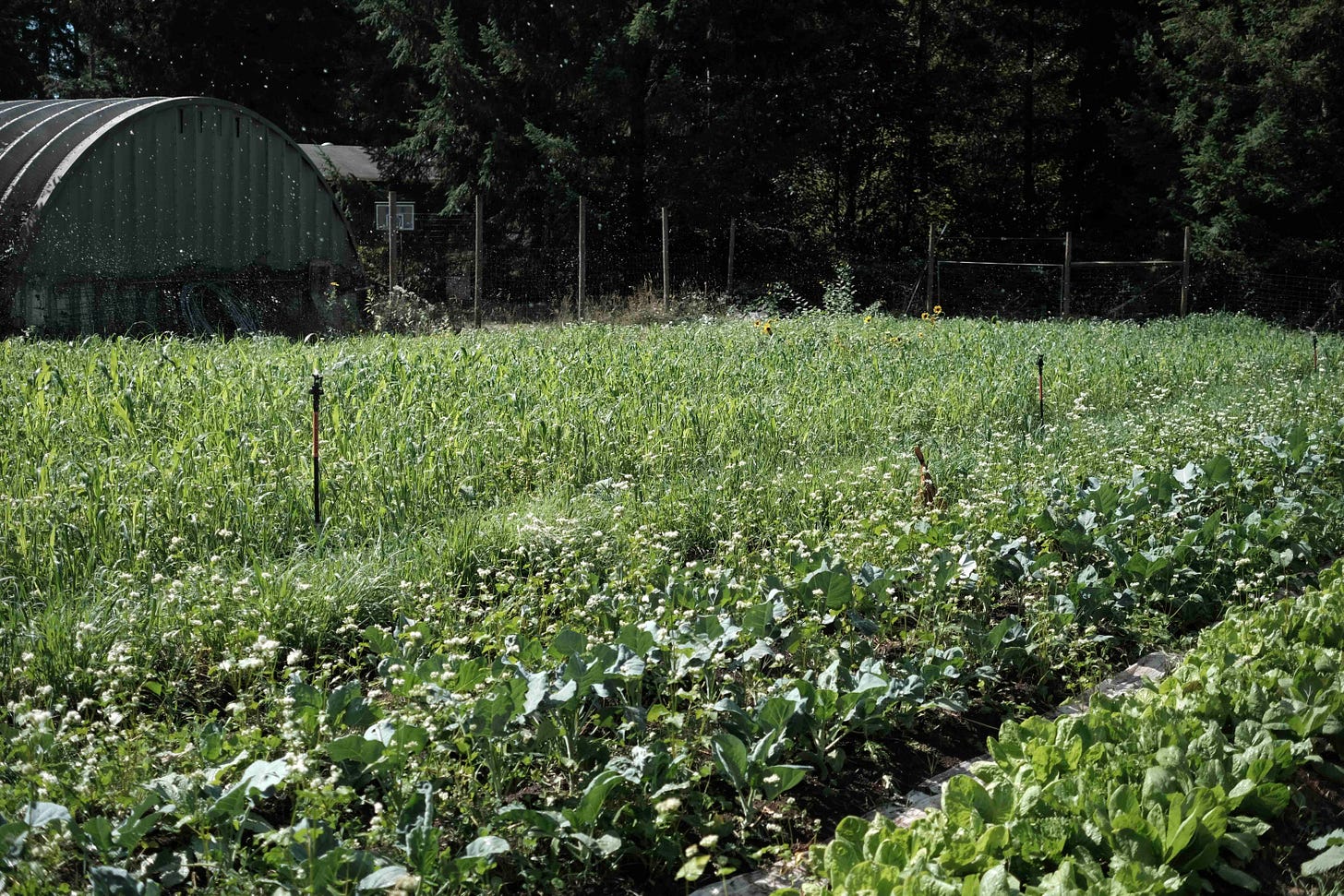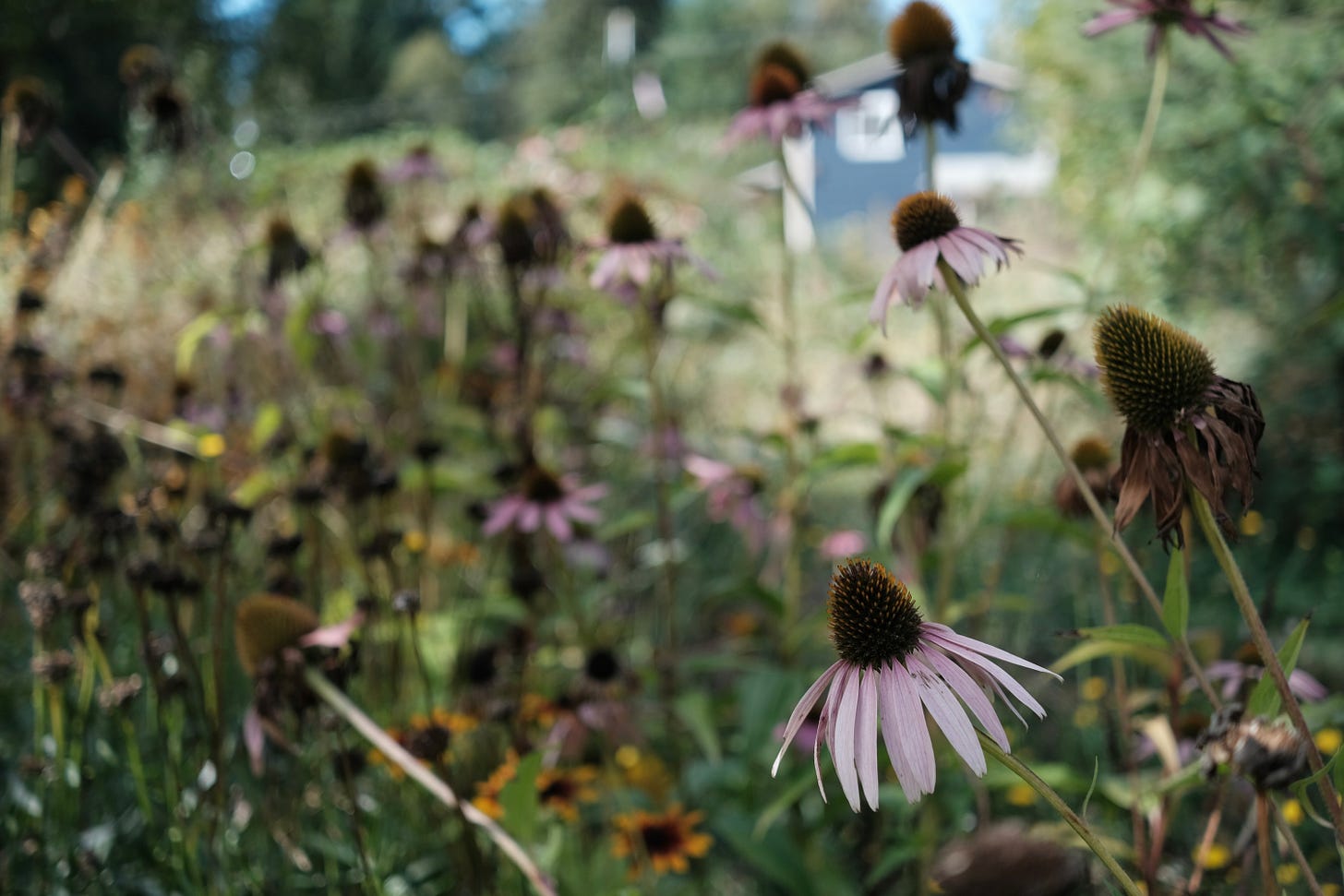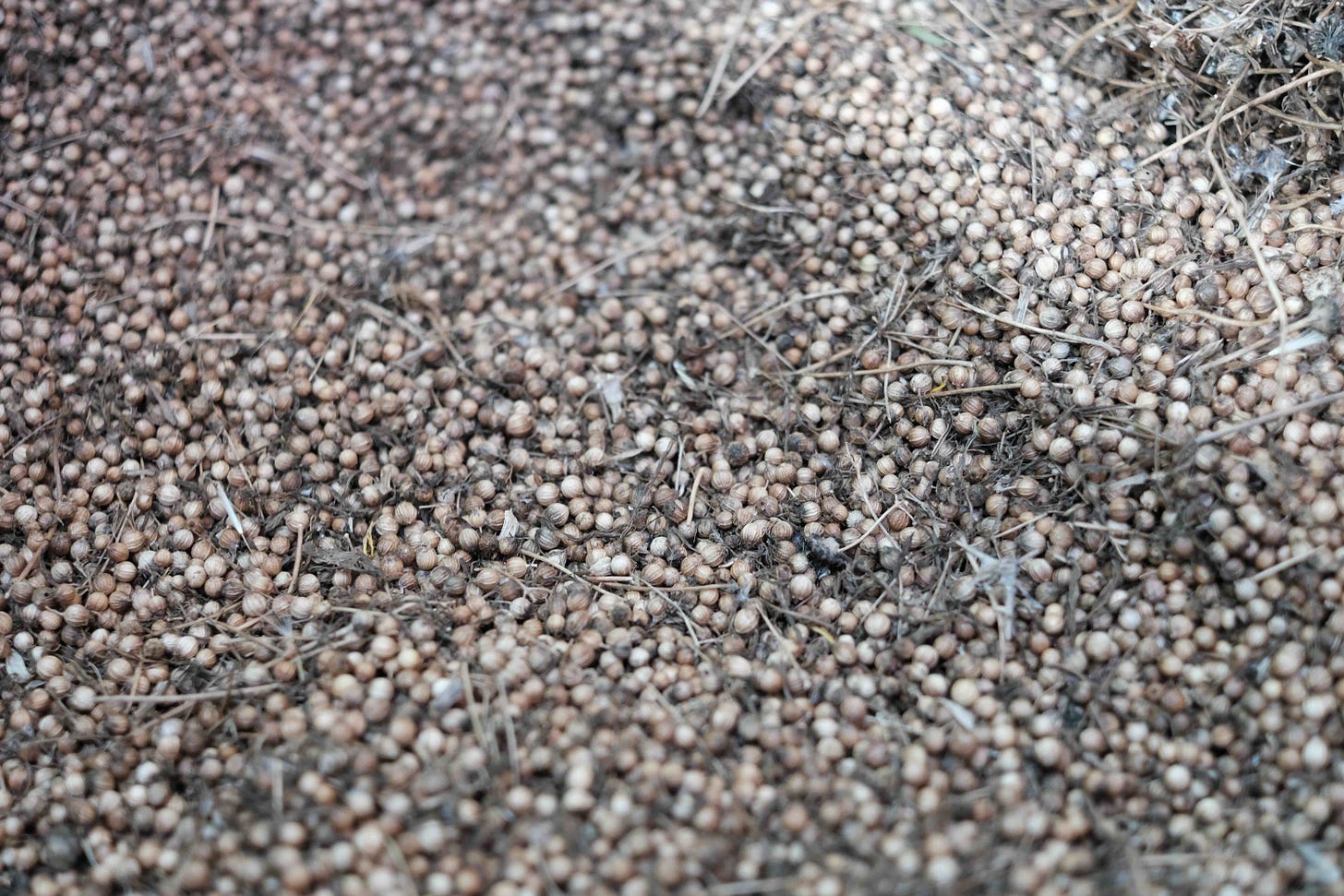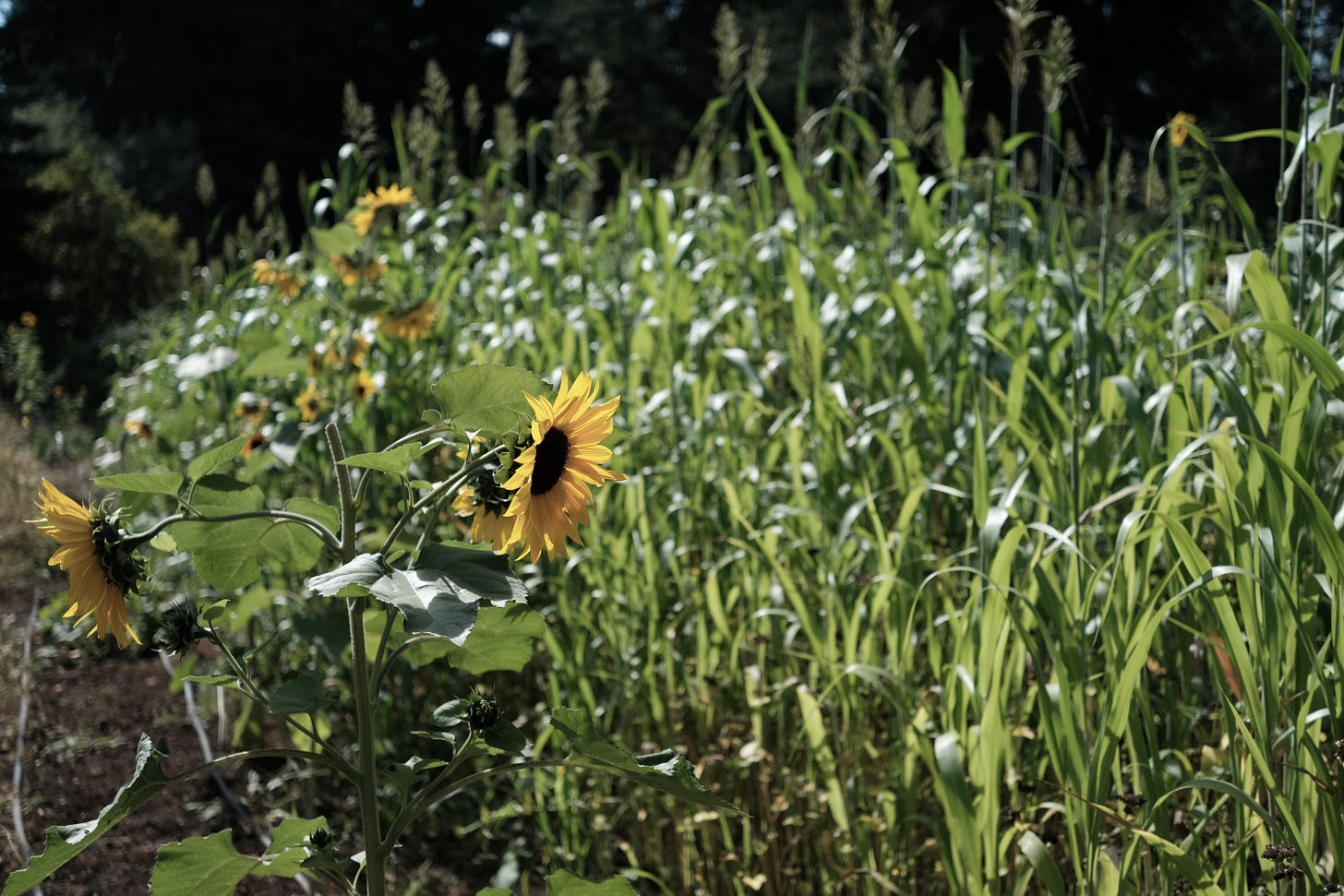Throughout my travels around the Pacific Northwest, there has been one place that has been an anchor - somewhere I have returned to throughout the early and later stages of my journey - that has provided me with both stability and unceasing inspiration.
Blue Raven Farm is a beautiful 5 acre property located near Corbett, north east of Portland. Nestled amongst woodland in the Sandy River catchment area, Jen and Casey Aron have been stewards of this land since 2015.
Jen Aron and I met through the Integrity Soils CREATE programme last September, and immediately hit it off. Sharing a love of soil and connection to nature, we spent the following 8 months taking a deep dive into all things regenerative farming together, becoming study partners and firm friends. Although CREATE was held in the UK, it attracted people from across the world, and Jen was one of those folks who had made the extra effort to participate from afar. As luck would have it, it turned out Jen is based in Oregon, one of the first stops on my planned Churchill Fellowship travels, so it was with much excitement that I first visited her farm back in May.
Jen has been farming since 2008, originally working for OSU extension, she battled with the struggles of annual tillage and fertiliser applications in conventional organic systems for many years before shifting her focus to agroecology. Realising that there must be another way to farming, Jen started to explore one of the most complex ecosystems on earth – soil. She signed up for the Soil Food Web School and sought out all of the groundbreaking research she could find in this emerging area of science. These explorations beautifully coincided with her and Casey’s move to Blue Raven Farm, providing her with a space to test out her newly acquired knowledge and eventually leading her to CREATE.
As Jen came to recognise and understand all of the billions of microorganisms under her feet, her practices leaned to minimising disturbance of their homes through reducing tillage. And once she better understood the beings that inhabited the soil, it was a logical next step to look at ways to feed and nurture them, so Jen started to use extensive cover crops in the rotation, leaving organic residue in situ when clearing beds to feed and support the biology below. There are no herbicides or pesticides used at Blue Raven Farm, instead Jen chooses a more holistic approach, making her own fungally dominant compost and vermicast extracts to stimulate biology, and inoculating seed before planting with trace minerals and biology.
In centring management practices around soil health, Blue Raven Farm has overcome some impressive challenges over the years. Symphylans that historically decimated root systems of newly planted crops are but a memory, and the weed burden within beds is drastically reduced. All of this has been carried out with the primary focus of running a thriving CSA scheme - the ecologically abundant soils producing healthy and nutrient dense crops which have been shared, up until recently, with the local community. Providing 60 CSA shares from just half an acre, Jen applied the regenerative practices she was learning to grow a bounty of delicious produce, delivering to the Mt. Tabor, Troutdale and SE Portland areas for 24 weeks of the year.
In 2024, Jen took the brave decision to take a break from growing for the CSA scheme, instead focusing her attention on CREATE, and fully embracing her role as a soil health advisor with the East Multnomah Soil & Water Conservation District (EMSWCD).
‘I’ve always been a farmer and an educator, I’ve never been able to pull those things apart. My very first farm gig was teaching, I was learning how to farm and turning around and teaching it right away, for a lot of years. And so it’s always been that. I think it’s always been about trying to get folks to connect to the soil, to the earth, to food and back to themselves.’
Jen works with the EMSWCD at their Headwaters farm near Gresham, where they run an incubator programme offering affordable and accessible access to farmland, resources and training for motivated and experienced individuals wanting to start their own farming businesses. As a soil health advisor at the site, Jen mentors programme participants, helping them navigate the complexities of farming on their lease plots, and empowering them to understand and grow healthy and resilient crops. The site at Headwaters is on marginal agricultural land - historically a ball and burlap tree nursery – and Jen has been working with the team there to run exciting soil health trials, encouraging a move away from traditional heavy discing and tilling and offering guidance in a more regenerative approach to soil management.
Understanding that everything is in life is intrinsically connected, Jen takes a whole systems approach to her work, not necessarily looking for those ‘silver bullet’ solutions, but instead asking lots and lots questions to better understand what is happening in each context. Jen is accompanying each of the farmers at Headwaters site on their own unique journeys of exploration, sharing all that she has learnt from a place of equity, integrity and love.
Back at Blue Raven Farm, soil is still at the heart of it all. When Jen and Casey arrived at the farm they planted hundreds of native trees, wildflower strips and an orchard, and the break from farming for the CSA this year has allowed them to focus attention on these aspects of the site, as well as on improving infrastructure. But soil has not been forgotten – Jen has sown the farm with incredibly diverse cover crops, inoculated with an array of biologicals and trace minerals. There are roots in the ground across the farm to encourage as much photosynthesis as possible, releasing those all-important root exudates to feed soil biology and store carbon. I helped to sow some of these on my first visit in June, and it was a joy to return and see them flourishing later in the summer. Extra exciting for me has been the emergence of some stewarding of seed crops at Blue Raven Farm…I wouldn’t want to take any credit for this, and it has been amazing to accompany Jen on this journey in understanding the connections between the soil and the seed. Last winter there were intense ice storms across this region, and many crops that would usually overwinter perished in the extreme conditions. Amazingly, some coriander plants survived this icy barrage, and Jen decided to allow these plants to go to seed, seeing the potential in their ability to survive for future crop resilience.
Spending time at Blue Raven Farm has been an important part of my journey. Although not a seed farm, my time here has been a persistent reminder of the connections between seed and soil health.
A recurring theme in many conversations throughout this trip has been that plants do not lack agency. There appears to be intention behind their behaviour and the relationships they form. In fact, in her recent book, The Light Eaters, Zoe Schlanger goes as far to say that plants ‘design the world around them to meet their needs’. This could certainly be said to be the case when it comes to the plant microbiome – the complex microbial assemblages formed by the plant. New research is revealing how a plant will actively select a microbial community to pass on to its progeny via the seed. It makes sense, therefore, that we do everything we can to help facilitate these relationships - by creating the most abundant and healthy environment for plants to flourish, and aid in passing that resilience on to the next generation via intentional seed keeping practices.
Blue Raven Farm offers a glimpse of what could be possible when these seed and soil narratives come together, and that has been incredibly exciting to witness. The farm has been such an inspirational place to return to on my travels. Always thriving with life, even in its rest year there is a sense of abundance and vitality. A home for all, it was exciting to hear Jen speak of what the future might hold for this very special place:
‘This education that we’ve just got from Nicole (Masters) and the CREATE team...how do we bring that to folks? Farmers work so hard to make so little, and they need all the help they can get. We need all the help we can get. I would like there not to be economic barriers for growing food that’s more resilient against climate change that we’re all dealing with, that’s making our jobs harder. And diversity is everything. It’s everything everything everything. From the community to the voices that are contributing to these big questions that we have, these potential solutions. And everybody working together to come to this place of greater understanding – we need all the voices. Just like we need all the microbes, we need all the birds, we need everything. Diversity is the crux - it’s everything.’
Jen is natural listener and a knowledgeable teacher, and it feels to me that Blue Raven Farm could become a hub of inspiration for others looking to move towards more holistic approaches to soil health and farm management. A place that could nourish and energise. With an acute understanding of the connections between plants, soil and seed, there’s a sense that anything is now possible for Blue Raven Farm.




